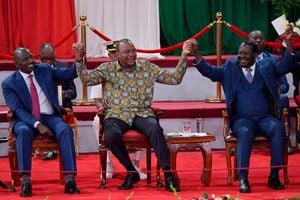
Banners depicting the various county governments on display at the Eldoret Sports Club in Uasin Gishu County during the devolution conference on August 16, 2023.
Devolution is all that Kenya needs to address political and economic challenges. It provides an opportunity for each region, community, groups and individuals to benefit from national development and at the same time collectively contribute to Kenya’s prosperity.
Unfortunately, it is disappointing that in the past 10 years there are those in national government ministries who seem not to understand the significance of devolution as a framework for political stability and overall national development and growth. These public officers have a default position to centralise powers and resources.
From 2013 when the first county governments were established, there are those who are yet to appreciate the importance of devolution as a solution to political and economic challenges that Kenya has continued to face from the early days of independence in 1963.
It is their attitude that was responsible for the first wave of industrial strikes witnessed in the health sector in the early days of devolution. They wanted to manage the health sector whether it is devolved or not. They kept the payroll of health workers and were determined to manage health workers from Nairobi. It is the same thinking that saw initiation of parallel agricultural subsidy programmes all over the country.
National government would import fertiliser for distribution to farmers in the counties. The county governments would also buy fertiliser for the same purpose on argument that the sector is devolved and that they know their counties better.
One can clearly tell who who imported fertiliser for ‘rents’ and who bought fertiliser to improve productivity in the counties. Overall, this is the attitude that has prevented effective delineation and transfer of functions.
Of course, many know that the transfer of functions would mean more resources to the counties because resources will have to follow functions. But those of this thinking need to open their minds and see the potential of devolution as a solution to political and economic challenges. And this is for a number of reasons.
Devolution is a solution to political challenges
Devolution addresses political grievances of distribution of resources and imbalances in development. In the past, only the powerful political elites would get their way in benefiting their regions with public resources.
The centralised government allocated resources often on basis of political considerations even when technocrats had better methods and priorities to allocate resources. But today all the counties have access to funds for development. This is gradually curing the sins of the past. Where the county leadership is effective, the counties are witnessing tremendous transformation delivery of services and people’s wellbeing.
Simply put, it is not by mistake that the Constitution provides for the 47 county governments to receive a share of national revenue every year. It is not an act of mistake that the Constitution specifies that no more than 15 per cent of national revenue will be allocated to the county governments to facilitate delivery of services. Equalisation fund itself was introduced as a ‘catch up’ fund to help the marginalised areas undertake development and catch up with the rest of Kenya.
This fund, however, is yet to meet its objective because political elites from well-off regions argued strongly for inclusion of all underdeveloped areas and, therefore, the resources are simply spread thin with little impact.
With access to resources, county governments can carry out development and provide services in line with local needs. If this is well executed, it has a major political impact: it lays a strong foundation for inclusive development and politics thereby addressing a fundamental challenge in Kenya’s political history.
Nonetheless, the problem is that some of the counties have done well in utilising their share of revenue. Their residents are satisfied with improved delivery of services. But there are counties where the county leadership is always putting their hands in the till. These are many. They are the ones that are giving devolution a bad name.
On the whole, because we have not approached devolution as a political solution to political challenges, its significance is lost in discussions about ‘wastage and corruption in the counties’. If well effected, intra-community conflicts and even inter-ethnic conflicts will come to an end as groups reap benefits of devolved services and resources. This is what the national civil services mandarins need to focus on – supporting devolution to ensure adequate benefits for all.
Devolution is a solution to economic challenges
Even more important is the potential of devolution to address economic challenges. Agriculture, health, county roads, water services, among other functions, are devolved functions to be undertaken by county governments.
This means that the national government cannot implement devolved functions without effective relationship with the county governments. Trust, cordial relationship, and common understanding are required to undertake some of these functions. But the mandarins sometimes think that these are roles to be undertaken by national government even without consultation with the counties.
This is where the problem lies: the counties are the movers of local development and, therefore, cannot be ignored in undertaking these functions. But what we have seen from 2013 is a tendency by national bureaucrats to get back these functions using gaps in law or enacting pieces of legislation to strengthen the hand of the national government in holding these functions. In the end, the national government ministries are implementing functions meant for the counties but do so with limited effectiveness.
For instance, the national government is holding on to the Roads Maintenance Levy which is distributed to constituencies under the elected members of National Assembly. County governments have budgets for roads too but may not be as much as what is allocated by the national government for use in the constituencies. What we have then is duplication of efforts and wastage of efforts and resources.
The time to act is now — to effectively implement devolution to address economic challenges. All the 47 county governments can contribute to economic development of the country if the challenges associated with devolution are addressed. This will certainly require the national mandarins to change their attitude towards devolution. They should see devolution as a solution to challenges. T
he national government ministries will have to relinquish the functions that belong to the counties or develop a framework for joint implementation of some of the functions for change to take place. The wastage of resources, duplication of efforts, and mistrust that continue to take place is a constraint to national development.
- Prof. Karuti Kanyinga is based at the Institute for Development Studies (IDS), University of Nairobi, [email protected], @karutikk







